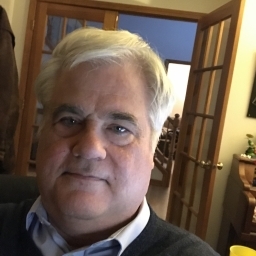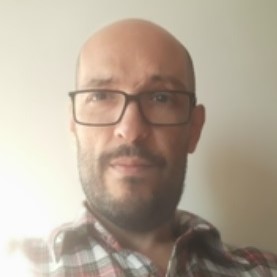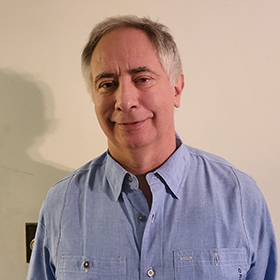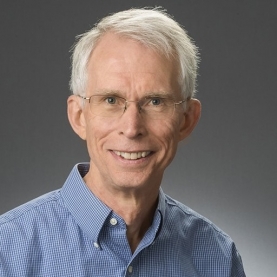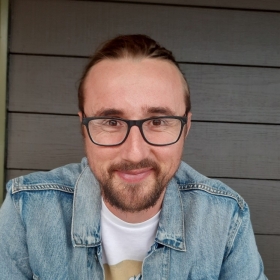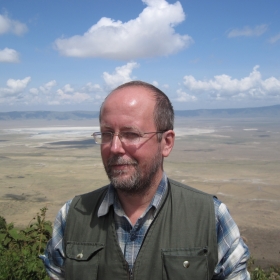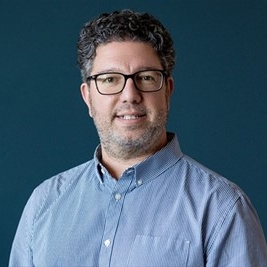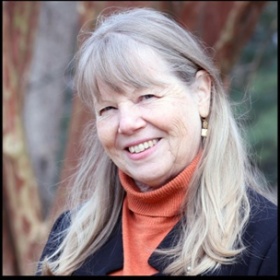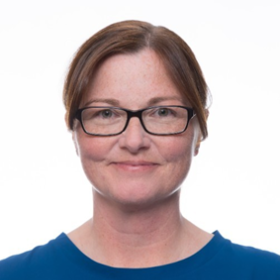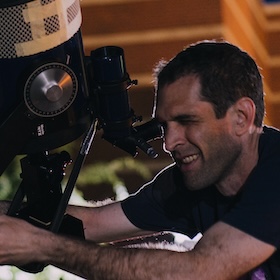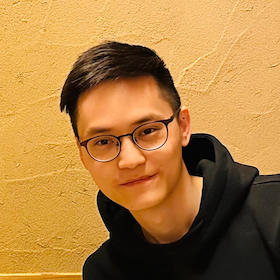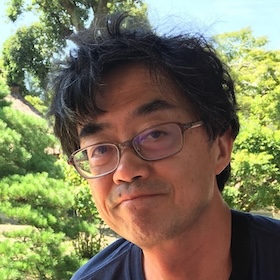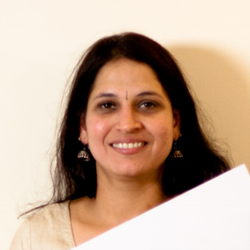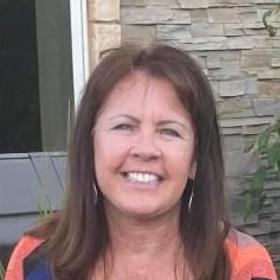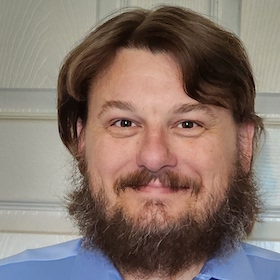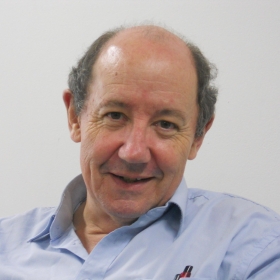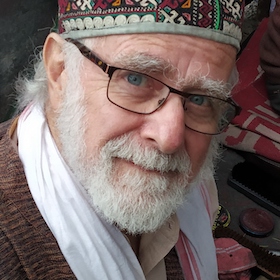Officers
(Google Earth Map)
David LePoire | President
Researches, develops, and applies science principles in environmental issues, Big History evolutionary trends, and particle scattering. He has a BS in Physics from CalTech, a PhD in Computer Science from DePaul, and over 30 years of experience at Argonne National Laboratory in the development of scientific analyses, software, training, and modeling. His research interests include Big History synergistic trends among energy, environment, organization, and information. He has presented at the IBHA conferences since the first in 2012 and has presented an IBHA webinar in Oct 2021. He has published articles in the Journal of Big History, the Evolution Almanac, and in 2020 co-edited a book with Andrey Korotayev concerning a Big History perspective of the singularity trend. He (along with Ken Solis) contributes to the “From the Journal” column of the newsletter and now also collaborates on the Emergence newsletter publication. He has started a Big History Research Group for continued international virtual conferencing and online communication.
Daniel de Pinho Barreiros | Vice President
Daniel Barreiros is an Associate Professor at the Institute of Economics, Federal University of
Rio de Janeiro, Brazil, Professor at the Comparative History Graduate Program (PPGHC-UFRJ)
and at the International Political Economy Graduate Program (PEPI-UFRJ). He received a PhD
in Social History from the Fluminense Federal University, Niterói, Brazil, and is a U.S.
Department of State Alumni from the Study of the US Institute on United States Foreign Policy
(Research Fellow at the Department of Political Sciences and International Relations, University
of Delaware). His research is centered on the Big History of intersocietal conflict and
cooperation. Daniel founded the Big History Lab at UFRJ-Rio de Janeiro, the first Big History
research group in his country.
Ken Solis, MD, MA | Treasurer
Ken Solis is a retired internist and ER physician with a master’s degree in bioethics. His long trips to and from work over the years also gave him many hours to listen to lectures on other fields in the sciences, philosophy, and history. By coincidence, he was teaching “A Brief History of the Universe” to adults before he encountered David Christian’s big bistory lectures for “The Great Courses.” His special interest in big history is what thermodynamics, information theory, and complexity science might reveal about how systems have, depending on the circumstance, progressed, regressed, and diversified over time. He has also applied these disciplines to the formulation of an information-centric ethical theory that was published in JBH.
Board Members
Lowell Gustafson
Lowell Gustafson is currently a member of the IBHA Board, IBHA Treasurer, Associate Editor of the Journal of Big History, and editor of Origins: The Bulletin of the IBHA. He earned his PhD in Government and Foreign Affairs from the University of Virginia in 1984 and has been on the Political Science faculty of Villanova University since 1986. Among his publications are “Big History and Political Science: Science, the deep past, and the political” in Craig Benjamin, Esther Quadackers, and David Baker, eds, The Routledge Companion to Big History, 2020; “SETI and Big History: Challenge and Extension,” Journal of Big History, IV(2); and Lowell Gustafson, David Blanks, Barry Rodrigue, co-editors, Science, Religion, and Deep Time, Routledge, forthcoming. He finds the development of an evidence based narrative of a 13.8 billion year series of developments from the big bang to present, along with reasoned expectations about the future, to be one of the great achievements of humanity. He highly values associating with others who share a fascination with integrating fields of knowledge and the meanings that a universe of knowledge offers humanity.
Max Barnett
Max Barnett is an Associate Lecturer at Macquarie University Law School in Sydney, Australia. He currently teaches and aids in curriculum development in the fields of law and world history. He writes on the fields of cliodynamics, sustainability, human rights, development economics, world history, and futures studies. Under the supervision of Professor David Christian Max completed his PhD entitled The Fork in the Road: Mapping Alternative Responses of Human Societies to the Threat of Collapse in 2024.
Max is part of several global research groups that focus on how understandings of Big History can be used to inform approaches to present and future global challenges. He maintains a small, informal network of Big History colleagues in Australia with the aim to strengthen the field’s place in Oceania. His recent pedagogical work has focused on designing imaginative learning exercises that can spread the wonder of the universe across disciplines and to students of varying levels of age and ability. Actively engaging with the local community, Max runs local history tours to bring stories of the deep past to those who would not normally engage with formal education.
Andrey Korotayev
Andrey Korotayev is an anthropologist, macro-historian, comparative political scientist, demographer and sociologist at HSE University, Moscow and Eurasian Center for Big History and System Forecasting, Institute of Oriental Studies, Russian Academy of Sciences. He engages in the study of universal evolution and Big History, as well as the analysis and forecasting of modern processes, especially, in the Middle East and Africa. Recently, he co-authored The Big History of Globalization (Springer Nature, 2019) and co-edited The 21st Century Singularity and Global Futures: A Big History Perspective (Springer Nature, 2020), as well as Navigating Complexity in Big History. Exploring Periodization Across Cosmic and Biosocial Dimensions (Springer Nature, 2025). He is especially interested in the detection (and possible mathematical description) of general patterns of the universal evolution, which appears to be only possible in the Big History perspective. He is also enthusiastic about the Big History’s potential to bring together people from different disciplines and with different perspectives, as well as to transform the education system.
Paul Narguizian
Paul Narguizian is a Professor of Biological Sciences and Science Education at California State University, Los Angeles. His research examines how information processing, energy flows, and increasing complexity shape biological systems, with a focus on integrating these concepts into undergraduate biology curricula. He explores both genetic and cultural informational inheritance as drivers of evolutionary and societal change, and develops courses that frame the genetic code as an algorithm of life while drawing parallels to cultural algorithms. His teaching emphasizes building students’ mental immunity and digital literacy, enabling them to recognize pseudoscience and navigate disinformation. Inspired by the work of David Christian, Brian Swimme, and Fred Spier. Narguizian designs pedagogical strategies that highlight the dynamic interplay of matter, energy, and information across scales, helping students see biology as part of a larger story of emergent complexity.
Lucy B. Laffitte
Lucy B. Laffitte, Ph.D., M.Ed. teaches science in context—from the Big Bang to the future—through outdoor experiences, classroom instruction, and online learning. A writer, broadcaster, and curriculum developer, she has shared science with diverse audiences in print, on air, and on the web. Her work includes founding an award-winning environmental radio program, creating conservation ecology certificate programs, and producing digital learning resources for public television.
Lucy holds a bachelor’s degree in natural science from the University of Oregon, a master’s in adult education and instructional design, and a Ph.D. in natural resources from North Carolina State University. She has designed and taught courses for museums, universities, conservation institutes, public television, and schools across the United States. An active leader in the International Big History Association, she has served as President, Vice President, Secretary, and Conference Chair. Her career reflects a lifelong commitment to connecting people with science, history, and the environment through innovative education and media.
Bridgette Byrd O’Connor
Bridgette Byrd O’Connor is a historian and educator specializing in Big History and world history. She received her DPhil in the history of science from the University of Oxford and taught at the secondary and university level in the United States and abroad, developing innovative courses that bridge history, science, and the humanities. A long-time contributor to the Big History community, she has developed curricula, including a revised Big History Project course for younger students, with the OER Project and Crash Course World History, with the goal of creating educational resources that make Big History accessible to students and the public. Her most recent work includes producing the Unknowns podcast with David Christian, which focuses on areas of Big History that remain mysterious. She has served as a mentor for Big History and world history teachers seeking to integrate global and interdisciplinary perspectives into their classrooms. Her work reflects a passion for connecting the deep past with contemporary challenges, helping learners see humanity’s place within the broader story of the universe.
Todd Duncan
Todd Duncan combines a research background in physics & astronomy with experience teaching science concepts to a wide range of audiences. His education includes a Ph.D. in Astronomy & Astrophysics from the University of Chicago and Physics degrees from the University of Illinois and Cambridge University. His core interest is understanding the fundamental nature of reality as best he can, while helping others discover their own ways to explore deep questions. Todd’s publications include Your Cosmic Context: An Introduction to Modern Cosmology (co-authored with Craig Tyler and published by Pearson Education, 2009), and “Meaningful Mystery,” a chapter in Science, Religion, & Deep Time, edited by Gustafson, Rodrique, & Blanks (2022). He teaches at Pacific University in Oregon.
Aidan Wong
Aidan Wong, a graduating Ph.D. candidate at The Hong Kong University of Science and Technology, specializes in interdisciplinary learning and sustainability education. His research focuses on integrating Big History into sustainability education, with presentations at international conferences. Alongside his university role, he collaborates with the Hong Kong Academy for Gifted Education to teach Big History and Sustainability to gifted secondary students. Aidan has authored journal papers, news articles, and two course handbooks: “Big History: A Scientific Origin Story” (2019) and “Introduction to Sustainability for the 21st Century” (2020), in partnership with the Hong Kong Scholars. Recognized as a local pioneer in advancing Big History, he seeks to strengthen connections among local Big Historians and foster collaboration between local, regional, and global Big History initiatives.
Hirofumi Katayama
Hirofumi Katayama is a Professor of Environmental Economics and the Director of the Oberlin Big History Movement (OBHM) at J.F. Oberlin University in Tokyo. He introduced the first formal Big History course in Japan in 2016, covering 13.8 billion years of history and inaugurated the Big History Seminar. In 2019, he organized the inaugural International Big History Symposium in Japan. His commitment to advancing Big History continued with the establishment of the interdisciplinary Big History Collegium in 2020. Katayama’s research centers on challenging anthropocentrism in mainstream Big History, proposing an alternative perspective known as Buddhist Big History.
Shweta Sinha Deshpande
Shweta Sinha Deshpande is Director (Associate Professor) at the Symbiosis School for Liberal Arts, Symbiosis International University, Pune. An archaeologist and anthropologist with over fifteen years of research experience, she brings an interdisciplinary perspective to the study of human history and culture. Her work explores how interactions between individuals and cultures—ancient and modern—shape societies, with a particular interest in how education can address contemporary social issues by uncovering often-unrealized cultural assumptions.
At Symbiosis, she has developed and taught innovative undergraduate courses such as Understanding India, The Idea of Art, and Comparative Religion, From Ape to Alexander and Beyond, while also leading efforts to establish an undergraduate program in anthropology. Her research highlights how even small artifacts, like pottery fragments, can illuminate the social, economic, and cultural dynamics of the past. Currently, her work focuses on globalization and its influence on migration, religion, education, and development. She is also engaged in international collaborations, including teaching and research partnerships with DePaul University in Chicago.
Stephen Satkiewicz
Stephen Satkiewicz is an independent scholar whose research areas are related to Civilizational Sciences, Social Complexity, Big History, Historical Sociology, Military History, War studies, International Relations, Geopolitics, as well as Russian and East European history. He is the Book Review Editor for the academic journal Comparative Civilizations Review. He served as the editor for the International Society for the Comparative Study of Civilizations (ISCSC) newsletter from 2016-2018. He produces a podcast for the New Book Network on books concerning topics in his research area.
Staff
Donna Tew | Office Coordinator
Donna Tew has been the IBHA Office Coordinator since 2014. She manages the data base for the IBHA membership and organizes the bi-annual conferences. Donna owns a travel business and has extensive experience in office management, including budgets, schedules, travel arrangements, and computer programs. Prior to 2014 she had been an Administrative Assistant of 32 years for a high school in Grand Rapids, Michigan.
Heathe Kyle Yeakley | IT Director
Heathe Kyle Yeakley was born and raised in Oklahoma, where he discovered paleontology on an elementary school field trip in the early 1980’s. It fascinated him to think that Earth had existed for so long that entire ecosystems populated with strange and wonderous creatures had come into being, existed for millions of years, collapsed, and, with their demise, laid the foundation for the cycle to repeat.
In college, he pursued technology as a profession but kept paleontology as a primary hobby. In 2000, he began to volunteer and the then-brand-new Sam Noble Oklahoma Museum of Natural History. Over three years, he accrued hundreds of hours of volunteer work interpreting ancient life exhibits for the public while working full-time and working towards a technology degree.
Today Heathe holds degrees in telecommunications and network management. He is a senior Linux DevOps Engineer and provides technology services to financial companies operating on the American East Coast.
When not looking for ways to apply his technology skills to explore deep time, he can be found watching courses by the Teaching Company and playing with his dogs.
Emeritus Board Members
David Christian
David Christian (D.Phil. Oxford, 1974) is a Professor Emeritus of Macquarie University in Sydney, after retiring at the end of 2020. He taught for many years in the Department of Modern History, and has also taught at San Diego State University, and Ewha University in Seoul. For many years, he taught and researched in Russian and Soviet history, and his textbook histories of modern Russia, Power and Privilege and Imperial and Soviet Russia have been widely used in schools and Universities. He has also published a two-volume history of Inner Eurasia for the Blackwell History of the World. Since the 1990s he has also taught world history and courses in big history, which cover the entire history of the Universe. In 2004 he published Maps of Time: An Introduction to Big History. With the support of Bill Gates, he helped create a free online big history course for High School Students, called the “Big History Project”. His 2011 TED talk, “A History of the Universe in 18 minutes” has been viewed more than 10 million times. In 2013, with Cynthia Brown and Craig Benjamin, he published the first University text on big history. He has recently published Origin Story: A Big History of Everything and is currently working on a big history of the future and future thinking.
Barry Rodrigue
Barry Rodrigue (Ph.D. Université Laval 1999) is a geographer, archaeologist and folklorist, serving as Full Professor of Anthropology and Scholar-in-Residence at Symbiosis International University, Pune, Maharashtra (India). He began his career as an ethnographer and field biologist in Alaska, where he studied natural / cultural landscapes among Indigenous communities. A Fulbright Scholar, he worked as a research geographer at Université Laval (Québec) and associate professor of humanities at the University of Southern Maine (USA). His strategy of integrating local, regional and global inquiry into a unified context made him an early advocate of universal studies. This was not surprising, since he was a student of astrophysicist G. Siegfried Kutter, a developer of Cosmic Evolution and Big History. A founder of the International Big History Association (2010) and the Asian Big History Association (2014), Barry also served as their international coordinator. He was editor-in-chief of the three-volume collection, From Big Bang to Galactic Civilizations: A Big History Anthology, for which he assembled articles by 100 scholars from 25 nations with big-historians Andrey Korotayev and Leonid Grinin. Barry’s present work focuses on global human adaptation, and he is assembling a deep-time study of Southeast Asia’s agriculture and the climate crisis with Earth-scientists Shamshuddin bin Jusop and Firdaus bin Anuar. Barry is a strong proponent of engaged scholarship, where researchers work with grassroot communities around the world to resolve problems through shared ideas and networks.

